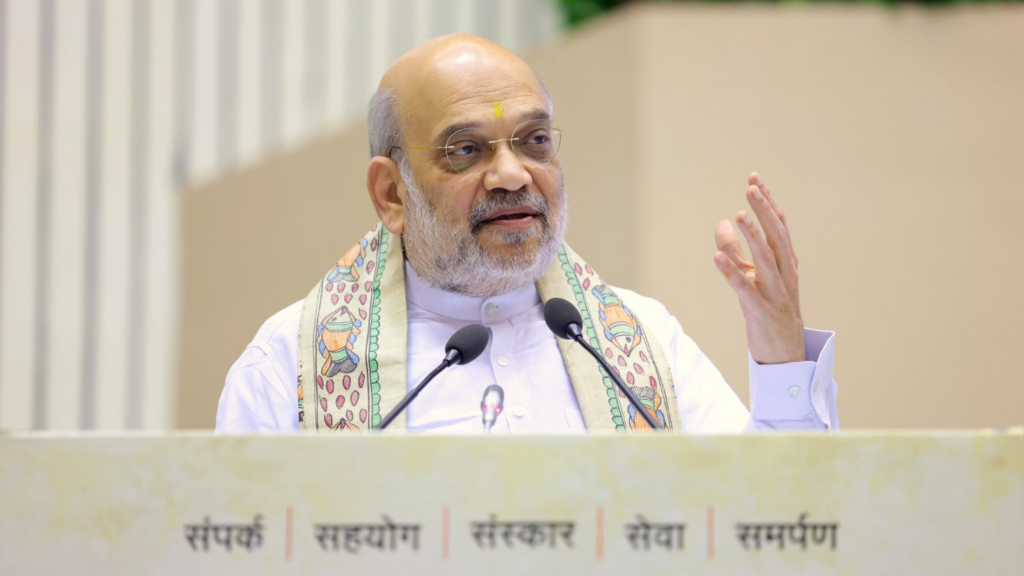WHEN Union Home Minister Amit Shah unveils a new national cooperative policy Thursday, replacing one in place for the past 23 years, it will mark another milestone for the department whose role has been expanding under the Narendra Modi government.
As per the statement issued by the Cooperation Ministry, the new policy is part of the Centre’s aim to strengthen cooperatives in the country, and “will prove to be a milestone in the cooperative movement of India for the next two decades from 2025-45″.
The ministry said a new policy was needed because of globalisation and technological advancements in the past two decades.
The Ministry of Cooperation was formed as a separate ministry by the Modi government four years ago, with Shah given the charge of it. From 1979 till then, the cooperatives department fell under the Agriculture Ministry.
The new ministry, Sahkarita Mantralaya, was announced via a two-page notification in the official gazette, a day before Modi effected the biggest reshuffle of his second term, on July 7, 2021. Its vision was stated to be ‘Sahakar se Samriddhi (Prosperity through Cooperation)’.
The notification laid out the wide jurisdiction of the new Cooperation Ministry: framing policy to coordinating cooperation activities across sectors; strengthening the cooperative movement and deepening its reach; promoting a “cooperative-based economic development model”; winding up of cooperative societies with objects not confined to one state; and training of personnel of cooperative departments and institutions.
Story continues below this ad
From a modest office at Krishi Bhawan, the Cooperation Ministry got a new address, the Atal Akshaya Urja Bhawan, on Lodhi Road. Several of its wings are housed in another new office complex called World Trade Centre.
Addressing an event to mark four years of the Cooperation Ministry at Anand in Gujarat on July 6, Shah said that PM Modi had “breathed new life” into more than 8.4 lakh cooperative societies, connecting about 31 crore people.
The growth
The government’s emphasis on cooperatives, also reflected in the choice of Shah to lead it, is understandable from the perspective of the sector’s significant contribution to the economy, and as a source of employment for millions of people.
In the last four years, the ministry has seen several big initiatives, including the Multi-State Cooperative Societies Act, 2023, that ushered in three new cooperative bodies, including National Cooperative Exports Limited (NCEL), with plans for “the world’s largest grain storage scheme” and two lakh new Multi-Purpose Primary Agricultural Credit Societies.
Story continues below this ad
Earlier this month, Shah laid the foundation stone of India’s first national cooperative university, and advocated that cooperative education be included in the secondary school curricula.
In a statement on September 8, 2022, the Cooperation Ministry said: “The cooperative sector gives 20% of the total agricultural credit of the country, 35% of the fertilizer distribution is done by the cooperative sector, 25% of fertilizer production, 31% of sugar production, more than 10% of milk production is done through cooperatives, more than 13% procurement of wheat and more than 20% of the procurement of paddy is done by the cooperative sector, and more than 21% of the fishermen’s business is done by cooperative societies.”
The formation of the NCEL has also opened up the export sector for cooperatives. Within months of its establishment, the NCEL received orders of rice and wheat from several countries, amounting to a total of Rs 5,000 crore.
With Primary Agriculture Cooperative Societies allowed to diversify, their business activities now cover more than 25 fields, including dairy, fishery, floriculture, setting up of godowns, procurement of foodgrains, fertilizers, seeds, LPG/CNG/petrol/diesel distributorship, short-term and long-term credit, fair price shops, and Common Service Centres which help people access government benefits.
Story continues below this ad
Former Kerala-cadre IAS officer Devendra Kumar Singh, who served as the first Secretary of the Cooperation Ministry in 2021-22, and is now the chairperson of the Cooperative Election Authority says it has helped bring transparency into the system – “in conduct of elections, increasing accountability of elected members to reforms and aligning bye-laws of societies with the Act and Rules”.
Umakant Dash, Director, Institute of Rural Management Anand, talks about the rise in capacity building and training by “many fold in the past four years”.
The evolution
The history of the cooperative sector dates back to before Independence, with a Cooperative Credit Societies Act enacted in 1904. Within a few years, there was an exponential expansion in the sector, with the number of societies registered under it increasing to 5,300 and their membership to over 3 lakh by 1911.
On December 14, 1946, eight months before the country got Independence, the Khera District Cooperative Milk Producers Milk Union, or Amul, was registered.
Story continues below this ad
After Independence, the cooperative sector retained a prominent place in Five Year Plans.
The year 2002, when the NDA was in power under A B Vajpayee, saw a new focus on the cooperative sector, with the government modifying the Multi-State Cooperative Societies Act and releasing a National Cooperative Policy. The same year, the law was amended for direct funding of cooperatives.
In 2011, under the UPA government, the 97th Constitutional amendment was passed, providing constitutional status to cooperative societies.
Cooperatives and politics
Cooperatives have long played an important role in the country’s rural economy, and political parties that control these have traditionally held a hold on the region electorally.
Story continues below this ad
However, former NAFED chairman Bijender Singh pointed out, the network of cooperatives has been weakening across states, and now stands limited largely to Gujarat and Maharashtra – of the 8.4 lakh registered cooperative societies, Maharashtra accounts for 2.24 lakh and Gujarat for 85,370. “The cooperative network has an impact on general politics in only these two states, with several prominent leaders of national parties as well as regional parties actively involved in cooperative politics.”
One of the focus areas of the Cooperation Ministry under Shah, in fact, has been expanding the network to states like Uttar Pradesh and Bihar.


